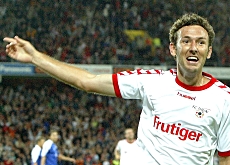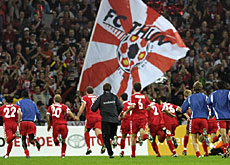Thun scores high for quality of life

The lakeside town of Thun has found itself thrust into the spotlight following the surprising success of its football club at the European level.
swissinfo spent the day discovering the new spirit that has swept through Thun in recent years, and which has manifested itself in its high-flying football club.
The residents here are quietly proud of their club’s achievements, having qualified for the first time for the Champions League. There are no outward signs in the town of football fever: no FC Thun flags fly from lamp poles, or fan banners displayed in shop windows.
Instead, the streets are draped with the flags of Switzerland, canton Bern and the town.
A single gold star on the Thun coat of arms is a symbol of victory; not of recent success on the football pitch but for its men’s courageous efforts on the battlefield during the Burgundian Wars of the 15th century.
At first glance, Thun lives in its past. The council and local authorities have their offices in the 16th century town hall and the 19th century Thunerhof, which was originally built as a grand hotel, as well as in the tidy buildings in the grounds of the medieval castle high above Thun’s clutter of streets and alleyways.
Large investments
Large sums have been invested over the past few years to restore and renovate other important heritage properties.
Thun’s first hotel, the Bellevue, has become an old people’s residence, and the Bellevue’s former annex located on the site of the first passenger boat landing has been turned into a fine dining restaurant.
Even the lake water entering the River Aare is funnelled beneath ancient covered sluice bridges, which connect the small island at the heart of Thun with the industrial and commercial sectors in the west and the medieval centre to the east.
“We prefer it to Interlaken because there’s more history here,” says Robert Lodge, a British tourist taking pictures along the picturesque, split-level pedestrian zone in the upper old town. “There isn’t as much hustle and bustle as there is in Interlaken.”
Despite its historic charms, Thun struggled for decades in the shadow of the Swiss and cantonal capital, Bern, and its tourist centre, Interlaken. Bern is bigger and more cosmopolitan; Interlaken has much higher mountains and many more hotels to accommodate the tourists coming to see them.
Economic recovery
But that has been slowly changing, due largely – ironically – to a sudden economic downturn in the early 1990s. As part of a major restructuring, the largest employer, the federal government, laid off nearly half of the employees at its Thun army base.
It coincided with the bankruptcy of a local bank, with many residents losing their life savings.
The retail trade, healthcare and construction industries took up much of the slack, and reasonable property prices made Thun an attractive dormitory community for people working in Bern 30 km away.
Going almost unnoticed amid the bad news was the development of a counterculture movement, which improved the town’s image among young people.
“There was nothing to do here 20 years ago,” says Padu Anliker, the leading voice of Thun’s alternative scene, who organises concerts and runs the popular nightclub, Café Mokka.
“The town used to close down at 11 o’clock,” he continues as he sips an espresso in his eccentrically decorated club.
Party town
Without a licence from the local authorities, Anliker began organising open-air events to promote Café Mokka, but in the end helped Thun develop its current reputation as a party town.
The nightclub and several other dance halls and late night locales are to be found in the factories and warehouses of the industrial quarter which were abandoned a decade or so ago.
“I think a new generation is taking over,” says Matthias Harte, a 37-year-old marketing professional who organises the Thunfest, the biggest annual music festival in the region, and dance parties on lake boats.
The Mühleplatz, the square in the old town centre, is the focal point for the Thunfest and many other open-air events.
But at any time of the day or night, people gather to see and be seen at the trendy cafés lining the square and the pedestrian alleys and bridges which sprout off in all directions.
Best of both worlds
Another example of the town’s new-found confidence is the annual Swiss Economic Forum. Launched in the late 90s, the Thun-based forum is the top meeting of its kind in Switzerland, bringing together young entrepreneurs and heads of small and medium-sized businesses.
Harte says many young people who have grown up in Thun choose to remain because it has all the benefits of a small town, including the beautiful natural surroundings, plus the attractions of a big city.
The proof of the pudding is the fact that Thun is one of the few towns in Switzerland with a growing population.
“When you get up in the morning, it only takes five minutes to get to work without having to worry about catching a bus, tram or taxi,” Anliker says.
“If you need a break from work, you can hop on your bike and be at the lakeshore in a couple of minutes. The quality of life is much higher here than in a big city.”
swissinfo, Dale Bechtel in Thun
The town of Thun has a population of 41,000.
It boasts a well-preserved castle and medieval centre built along the River Aare.
Thun has a lively nightlife, with clubs operating out of abandoned factory buildings close to the centre.

In compliance with the JTI standards
More: SWI swissinfo.ch certified by the Journalism Trust Initiative













You can find an overview of ongoing debates with our journalists here . Please join us!
If you want to start a conversation about a topic raised in this article or want to report factual errors, email us at english@swissinfo.ch.